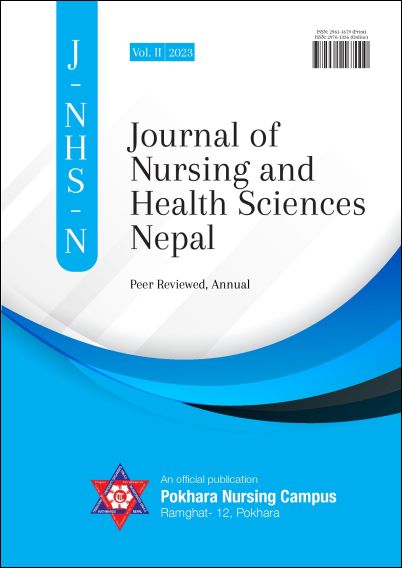Sleep Quality and Stress among Nursing Students during COVID-19 Pandemic
DOI:
https://doi.org/10.3126/jnhsn.v2i1.66429Keywords:
COVID-19, nursing students, sleep quality, stressAbstract
Introduction: Long-term stress has a significant impact on people's ability to fall asleep. The study was conducted with the aim to assess the sleep quality and stress during COVID-19 Pandemic.
Methods: A cross-sectional descriptive study was done among nursing students. One nursing campus was selected from the total of six bachelor level nursing campuses in the Pokhara from simple random lottery method. All the bachelor level students of that campus were included in the study. Data were collected through self-administered questionnaire using Pittsburgh sleep quality index and perceived stress scale. The collected data was analyzed using Statistical Package for Social Science 16. Chi square test was used to identify the association between level of sleep quality and COVID related variables. Pearson’s correlation was used to examine the relationship between stress score with sleep quality. P value <0.05 was considered as statistically significant in all inferential statistical procedures.
Results: The mean age was 24.208±3.028, 31.4 percent of students lived with their family and 81 percent of them had clinical posting during COVID-19. The 61.9 percent of students had good sleep quality whereas 38.1 percent had poor sleep quality. Likewise, majority (91.4 %) of students had moderate stress. A significant association was observed between sleep quality and students infected with COVID-19. Pearson’s correlation showed the students’ stress had significantly positive correlation with sleep quality (P=0.030).
Conclusions: The study concluded that prevalence of poor sleep quality was found in more than one third of the nursing students. The majority of students experienced moderate level of stress during COVID-19 Pandemic.
Downloads
Downloads
Published
How to Cite
Issue
Section
License
Copyright (c) 2023 The Author(s)

This work is licensed under a Creative Commons Attribution 4.0 International License.
This license enables reusers to distribute, remix, adapt, and build upon the material in any medium or format, so long as attribution is given to the creator. The license allows for commercial use.




